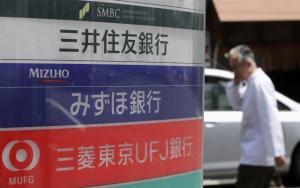Japan March household spending hits 39-yr high, but outlook
Bareksa • 02 May 2014

a man walking past a signboard of Japan's three mega banks, Sumitomo Mitsui Banking Corporation, Mizuho Bank and Bank of Tokyo-Mitsubishi UFJ, in Tokyo (REUTERS)
Household spending is likely to have fallen in reaction to the surge in March
Bareksa.com - Japanese household spending soared at the fastest annual pace in 39 years in March as consumers rushed to beat a sales tax hike that kicked off in April, setting the stage for a pull back in consumption that could hamper the economic recovery in coming months.
Other factors, however, may help to soften the blow on growth, with data showing the jobless rate held steady at a nearly seven-year low and the availability of jobs continued to improve.
"Household spending was stronger than expected in March, pointing to considerably high growth in private consumption in the first quarter on pent-up demand ahead of the sales tax hike," said Takeshi Minami, chief economist at Norinchukin Research Institute.
"The pullback in demand after the tax hike may be within expectation so far, as the Bank of Japan and the government argue. But we need to wait to see how consumption fares in May and June before making any judgment."
Household spending rose 7.2 percent in March from a year earlier, government data showed on Friday, far exceeding a median market forecast for a 1.0 percent increase. It was the biggest annual increase since March 1975.
Household spending is likely to have fallen in reaction to the surge in March, though policymakers hope expectations of improving job markets and higher wages will take the sting out of the tax hike.
The jobless rate stood at 3.6 percent in March, matching a median market forecast and steady from February, when it hit a level last seen in July 2007.
Separate data showed the jobs-to-applicants ratio rose to 1.07 from 1.05 in February, above economists' median estimate for 1.06, matching a high last seen in June 2007, a year before the Lehman crisis triggered the global financial crisis.
The increase in the national sales tax - to 8 percent from 5 percent - has sparked worries that consumers will tighten their wallets, threatening the economic recovery Prime Minister Shinzo Abe has engineered with aggressive monetary and fiscal stimulus.
But anecdotal evidence has shown the slump in spending in April has been moderate, underscoring the Bank of Japan's view that the economy can withstand the pain from the tax hike without additional monetary stimulus.
As widely expected, the BOJ earlier in the week maintained its pledge to increase base money, its key policy gauge, at an annual pace of 60 trillion to 70 trillion yen ($588-$686 billion).
Crucially, the BOJ also projected for the first time that inflation will exceed 2 percent roughly two years from now, underscoring its conviction that a sustained end to deflation is on the horizon.
Japan's economy has slowed since the second half of last year as the effects of Tokyo's aggressive stimulus policies faded, though economists expect the recovery to pick up pace later this year. (Source : Reuters)